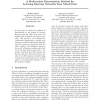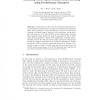143 search results - page 8 / 29 » Learning from cooperation using justifications |
156
click to vote
UAI
1998
15 years 4 months ago
1998
In this paper we address the problem of discretization in the context of learning Bayesian networks (BNs) from data containing both continuous and discrete variables. We describe ...
128
click to vote
ECML
2004
Springer
15 years 8 months ago
2004
Springer
In this paper, we show how the dynamics of Q-learning can be visualized and analyzed from a perspective of Evolutionary Dynamics (ED). More specifically, we show how ED can be use...
101
click to vote
SEKE
2007
Springer
15 years 9 months ago
2007
Springer
— We present a statistical approach for software agents to learn ontology concepts from peer agents by asking them whether they can reach consensus on significant differences bet...
120
click to vote
AAAI
2000
15 years 4 months ago
2000
We introduce the notion of restricted Bayes optimal classifiers. These classifiers attempt to combine the flexibility of the generative approach to classification with the high ac...
148
Voted
ICRA
2006
IEEE
15 years 9 months ago
2006
IEEE
— Many application tasks require the cooperation of two or more robots. Humans are good at cooperation in shared workspaces, because they anticipate and adapt to the intentions a...


